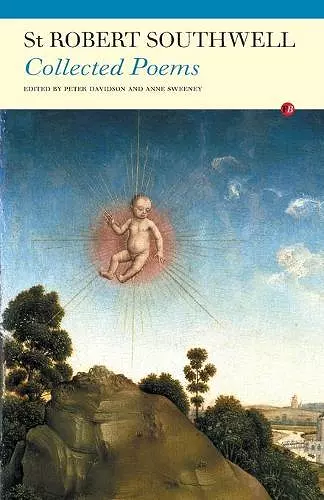The Collected Poems of S. Robert Southwell
Saint Robert Southwell author Peter Davidson editor Ann Sweeney editor
Format:Paperback
Publisher:Carcanet Press Ltd
Published:30th Mar '07
Should be back in stock very soon

INCLUDES AN INTRODUCTION AND AFTERWORD BY ANN SWEENEY AND AN ESSAY BY PETER DAVIDSON
One of our earliest English critics, Ben Jonson, famously wished that he had written Southwell's 'Burning Babe', the most famous poem of the body of spiritual verse writtenby the Elizabethan priest, poet and martyr S. Robert Southwell SJ (1561-95). This book is a complete, authentic edition of Southwell's poems, in English and Latin, offering new texts based on the very manuscripts which were circulated in secret among English Catholics in the years following the poet's death. By re-examining these contemporary manuscripts, this edition allows Southwell's poems to regain some of their original purpose of communicating forbidden theologies and doctrines amongst a criminalised and near-silenced readership of secret groups. These are the poems of those Catholics who did not or could not flee the country as the Elizabethan State bore down upon their faith in the last two decades of the sixteenth century.
Audacious and beautiful in themselves, Southwell's poems were also immensely influential in the the development of early modern English literature; his new visions and visualisations bear their fruit a generation later in the works of Donne and Herbert. Southwell's rare Latin verses, available here for the first time, accompanied by a new translation, demonstrate the significant creative debt owed to him by the Augustans, even by Milton.
Summer 2009
Robert Southwell (1561-95, canonized 1970), priest, missionary, poet, and martyr, was raised a Protestant, but his mother was from a Catholic family and persisted in that faith. Robert became a Catholic in his teens and almost immediately fled to Rome, where at seventeen he joined the Society of Jesus. Educated in Douai, Louvain, and Rome, he reached England in 1586 and, while hiding from government authorities, he ministered widely, especially in the circle connected with Lady Anne Dacres, the wife of Philip Howard, Earl of Arundel, who was then in prison for his faith. Having already written some Latin poetry, while on mission he composed in English a single long poem, 'Saint Peter's Complaint', a few dozen religious lyrics, and some prose texts. He was arrested in 1591 or 1592, at the time when 'Saint Peter's Complaint', his longest poem, was just being published.
Repeatedly subjected to torture, Southwell revealed nothing to endanger those to whom he had served as a priest, and after his death he was revered for his constancy as well as for his literary achievements. One consequence of this veneration is that manuscripts of his poetry were preserved, largely among Catholic families but in Protestant circles as well, with, for example, that firm Protestant Sir Philip Sidney one of his admirers. The most accurate surviving manuscripts have for centuries belonged to the Jesuit community at Stonyhurst in Lancashire. Some of the poems were printed, often with revisions to make them more acceptable to Protestant readers, from 1595 to well into the seventeenth century; Catholic editors brought out editions at St. Omer in Belgium. These poems, it is clear, attracted a substantial readership during the author's lifetime and in the years just after his execution.
Southwell's poetry is explicitly Catholic in theme; he wrote in acute awareness of the danger of imprisonment, torture and execution faced by Catholics in England, and in the expectation of his own eventual fate. He framed his fourteen meditations on the life and work of Christ with a series of five poems on Mary at the beginning and two on Mary's death and assumption into heaven at the end. Marian themes are prominent throughout teh whole sequence, as in the depiction of Mary's sympathy for the pain suffered by the infant Jesus at his circumcision and of course her profound sorrow at his passion and death.
This old-spelling edition, employing the minimal punctuation of the most authentic surviving manuscript and, for Southwell's single long poem, the most reliable early printed edition, is intended to bring readers today as close as possible to the experiences of Southwell's contemporaries and to make the understandings of Catholic readers of the late sixteenth century in a sense normative. There already exists a critical edition, The Poems of Robert Southwell, S.J., edited by James H McDonald, C.S.C., and Nancy Pollard Brown (Oxford:Clarendon, 1967). It omits the Latin poems and makes more eclectic use of the early manuscripts, but Davidson and Sweeney acknowledge that there are few substantive differences. Thirty pages of their edition are devoted to the Latin poems and to their English prose translations of these, and they make high claims for their literary and historic value. Of Southwell's works, only these are newly made available here; they include vivid narratives, in competent dactylic hexameters, of the Assumption of the Blessed Virgin and of the troubles of the Prodigal Son. The latter is ingeniously presented as a letter from the Prodigal to his father, suggesting an evident parallel with English Protestants who have broken away from the papal obedience.
There are helpful explanatory notes on individual poems, and an insightful 'Afterword: Deciphering Southwell' (121-44) analyzes both style and spiritual outlook, showing the author's adherence to Ignatian meditation and to the English Jesuit policy of avoiding direct controversy while suggesting the theological soundness of Catholic distinctives.
[...]
The chief merits of this book are that it has made the Latin poems available and that literary appreciation of the poems will be advanced by the editors' interpretations.
ISBN: 9781857548983
Dimensions: 216mm x 135mm x 15mm
Weight: 272g
180 pages